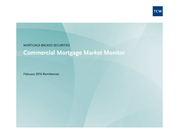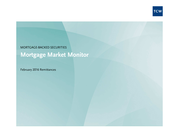Description
VIEWPOINTS: INSIGHT INTO EQUITIES
Equities in a Rising Rate Environment: A Roundtable Discussion
prices, and vice versa. If we think the dollar is going to weaken,
we’d expect that commodities would strengthen. The commodity
decline started to occur as the dollar started to strengthen. So
it’s important to watch that connection as we consider both
strong dollar today and possibly a weaker dollar in the future.
recession the bigger the rebound, and we have been plodding
along with moderate growth following a particularly severe
recession.
We are seeing positive growth and an improving employment picture. And certainly there are companies and industries that are doing better than others. But this is an unusual recovery in that M&A activity is currently above average for this point in the cycle, while growth in capital expenditure is well below what you’d normally see in a recovery.
The relatively low level of capital expenditures is one reason corporate margins are so high. Companies aren’t making big capital expenditures because of a general lack of confidence in the economic picture and the slowness of the recovery. John Snider: I think there are two questions to answer here. How does the strong dollar impact the economy and how does the strong dollar impact the stock market and our portfolio? The rise in the dollar index is definitely good for the consumer, which is two-thirds of GDP. It is good for companies importing raw materials and intermediate goods because it allows them to buy foreign goods and services (like traveling as an example) cheaper.
And, as Tom noted, it also helps to put downward pressure on commodities like oil as they are denominated in U.S. dollars. A strong dollar, on the other hand, may be detrimental for exporters or multinational companies who derive significant revenues in non-dollar currencies.
It does depend on whether there is a gradual appreciation in the dollar or an abrupt change in the exchange rate. The former usually reflects the strength in the economy and allows for companies to plan for a strengthening dollar so the impact will be mitigated and in some cases it is positive. However a sudden rise in the dollar for those companies that are impacted by this change can be quite harmful to revenues and profits because these companies cannot change their cost structure quickly enough to compensate.
A stronger dollar has hurt American exporters and in some cases dampened their investment plans for the upcoming year. Chang Lee: Agreed. Since 2009, the overall domestic economic recovery has been gradual and disappointing. However, we expect it to continue, and are hoping for acceleration.
We also expect the current upward trajectory in the economy to last longer than in previous cycles because of the significant slack in the global economy. At the individual company level, we continue to be selective regarding the companies included in our small- and mid-cap growth portfolios. As such, we have seen approximately 20% growth in 2015 and estimated growth of around 18%+ for 2016. The strong U.S.
dollar has been a concern among equity investors. How is a rising dollar impacting your analysis of portfolio holdings? Diane Jaffee: The rising dollar is impacting multinational portfolio holdings generally within a range of 10 to 15%. When asked if they would prefer a higher or lower Euro or Yen, U.S. companies generally respond that if quantitative easing is enabling these economies to stimulate their GDPs, they would rather take a 10-15% translation hit on an order than not have the order be placed.
The China Renminbi defense is more troubling if it means there is a lack of control. Craig Blum: Beginning earlier this year, we began analyzing in detail each company’s revenue and profit exposure to non-U.S. markets. We also performed a best efforts analysis around how each company thinks about and hedges its non-U.S. exposure. Our conclusion is that while the significant strength in the U.S.
dollar is certainly constraining reported top-line growth, we have all the necessary tools to properly evaluate true organic growth and earnings power underneath the accounting headache. Fortunately, the equity market has also generally looked through most of the dollar-related hit to growth and has more often than not properly responded to fundamental strength that exceeds “currency neutral” expectations. Tom McKissick: We are stress testing our portfolio for different dollar environments to ensure that we are properly positioned. One interesting thing to both note and consider as we look at our holdings is the commodity linkage with the dollar. There is a strong correlation between a strong dollar and weak commodity This material is for general information purposes only and does not constitute an offer to sell, or a solicitation of an offer to buy, any security.
TCW, its officers, directors, employees or clients may have positions in securities or investments mentioned in this publication, which positions may change at any time, without notice. While the information and statistical data contained herein are based on sources believed to be reliable, we do not represent that it is accurate and should not be relied on as such or be the basis for an investment decision. The information contained herein may include preliminary information and/or “forward-looking statements.” Due to numerous factors, actual events may differ substantially from those presented. TCW assumes no duty to update any forward-looking statements or opinions in this document.
Any opinions expressed herein are current only as of the time made and are subject to change without notice. Past performance is no guarantee of future results. © 2015 TCW 865 South Figueroa Street | Los Angeles, California 90017 | 213 244 0000 | TCW.com | @TCWGroup 4 MKTwp4386 12/16/15 .
We are seeing positive growth and an improving employment picture. And certainly there are companies and industries that are doing better than others. But this is an unusual recovery in that M&A activity is currently above average for this point in the cycle, while growth in capital expenditure is well below what you’d normally see in a recovery.
The relatively low level of capital expenditures is one reason corporate margins are so high. Companies aren’t making big capital expenditures because of a general lack of confidence in the economic picture and the slowness of the recovery. John Snider: I think there are two questions to answer here. How does the strong dollar impact the economy and how does the strong dollar impact the stock market and our portfolio? The rise in the dollar index is definitely good for the consumer, which is two-thirds of GDP. It is good for companies importing raw materials and intermediate goods because it allows them to buy foreign goods and services (like traveling as an example) cheaper.
And, as Tom noted, it also helps to put downward pressure on commodities like oil as they are denominated in U.S. dollars. A strong dollar, on the other hand, may be detrimental for exporters or multinational companies who derive significant revenues in non-dollar currencies.
It does depend on whether there is a gradual appreciation in the dollar or an abrupt change in the exchange rate. The former usually reflects the strength in the economy and allows for companies to plan for a strengthening dollar so the impact will be mitigated and in some cases it is positive. However a sudden rise in the dollar for those companies that are impacted by this change can be quite harmful to revenues and profits because these companies cannot change their cost structure quickly enough to compensate.
A stronger dollar has hurt American exporters and in some cases dampened their investment plans for the upcoming year. Chang Lee: Agreed. Since 2009, the overall domestic economic recovery has been gradual and disappointing. However, we expect it to continue, and are hoping for acceleration.
We also expect the current upward trajectory in the economy to last longer than in previous cycles because of the significant slack in the global economy. At the individual company level, we continue to be selective regarding the companies included in our small- and mid-cap growth portfolios. As such, we have seen approximately 20% growth in 2015 and estimated growth of around 18%+ for 2016. The strong U.S.
dollar has been a concern among equity investors. How is a rising dollar impacting your analysis of portfolio holdings? Diane Jaffee: The rising dollar is impacting multinational portfolio holdings generally within a range of 10 to 15%. When asked if they would prefer a higher or lower Euro or Yen, U.S. companies generally respond that if quantitative easing is enabling these economies to stimulate their GDPs, they would rather take a 10-15% translation hit on an order than not have the order be placed.
The China Renminbi defense is more troubling if it means there is a lack of control. Craig Blum: Beginning earlier this year, we began analyzing in detail each company’s revenue and profit exposure to non-U.S. markets. We also performed a best efforts analysis around how each company thinks about and hedges its non-U.S. exposure. Our conclusion is that while the significant strength in the U.S.
dollar is certainly constraining reported top-line growth, we have all the necessary tools to properly evaluate true organic growth and earnings power underneath the accounting headache. Fortunately, the equity market has also generally looked through most of the dollar-related hit to growth and has more often than not properly responded to fundamental strength that exceeds “currency neutral” expectations. Tom McKissick: We are stress testing our portfolio for different dollar environments to ensure that we are properly positioned. One interesting thing to both note and consider as we look at our holdings is the commodity linkage with the dollar. There is a strong correlation between a strong dollar and weak commodity This material is for general information purposes only and does not constitute an offer to sell, or a solicitation of an offer to buy, any security.
TCW, its officers, directors, employees or clients may have positions in securities or investments mentioned in this publication, which positions may change at any time, without notice. While the information and statistical data contained herein are based on sources believed to be reliable, we do not represent that it is accurate and should not be relied on as such or be the basis for an investment decision. The information contained herein may include preliminary information and/or “forward-looking statements.” Due to numerous factors, actual events may differ substantially from those presented. TCW assumes no duty to update any forward-looking statements or opinions in this document.
Any opinions expressed herein are current only as of the time made and are subject to change without notice. Past performance is no guarantee of future results. © 2015 TCW 865 South Figueroa Street | Los Angeles, California 90017 | 213 244 0000 | TCW.com | @TCWGroup 4 MKTwp4386 12/16/15 .
Financial Markets Presentations
+
Financial Markets Sub Categories














